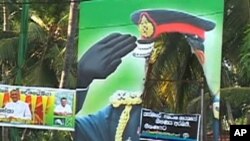An unusual political irony is reaching a climax on the South Asian island nation of Sri Lanka. The two proclaimed heroes of the recently-ended quarter century civil war, who are openly accusing each other of war crimes, are facing off in the country's presidential election Tuesday. The two Sinhalese Buddhists have focused their campaigns on persuading the minority, mostly Hindu, Tamils, who bore the brunt of the war, to vote for them. The election is being closely watched by international agencies and donor governments. They hope whoever wins will quickly resettle displaced Tamils, demilitarize the country and support reforms designed to protect democratic rights.
During his final election rally Saturday night President Mahinda Rajapaksa sat with key political allies and Buddhist monks, on a stage replicating an ancient royal palace. Singers praised Mr. Rajapaksa as both a man of the people and a modern day king. He was also praised for the victory over the rebel Tamil Tigers, ending the civil war. :
The former general to whom others give credit for the military victory, Sarath Fonseka, is the main contender vying to unset the incumbent. He leads a diverse opposition coalition with seemingly incompatible views on crucial issues. The neck-and-neck contest has gone beyond just nasty political rhetoric alleging war crimes, corruption and incompetence.
Analyst Pakiasothy Saravanamuttu of the Center for Policy Alternatives says the campaign has seen hundreds of serious acts of violence, including several killings. "So what it does suggest is that there is a violence embedded in the political culture of the country and that it is a zero-sum political culture. And, therefore, literally, not just metaphorically, parties go to war with each other in an electoral contest," he said.
It is in Tamil neighborhoods that the fate of the election could be decided. With predictions that the Sinhalese vote will be split right down the middle both the President and the former General are courting the Tamil vote. But the big question for Tamil voters is will they be able to get to polling places on election day unhindered. "The issue here is going to be whether there will be violence and intimidatory activity which will prevent people from getting to polling stations."
General Fonseka, who has seen some of his campaign posters on the streets literally defaced, predicts desperate supporters of President Rajapaksa will do exactly that, especially in predominately Tamil precincts." "They'll come on the road on election day. There will be a lot of violence to intimidate the people, to turn the voters back because there's no other way out for them. They already lost the election," he said.
Despite the threats, retired Supreme Court Justice C.V. Wigneswaran tells VOA News he has been urging his fellow Tamils to come out of the political wilderness. "Despite all these heavy odds against them, of various groups trying to prevent them (from voting) or even Army collaboration in these matters, they must come forward and go to vote," he said.
President Rajapaksa, behind bullet-proof glass, in his last speech to supporters before campaigning drew to a close, did not mention the election violence. He vowed to embrace the hundreds of thousands of Tamils still displaced by the blood-filled chaos of the civil war's final months last year. "We will win the hearts of the (Tamil) people in the North and East of the country and make certain terrorism does not resurface," he said.
Both the President and his former top general, now a bitter rival, express confidence they will be victorious. For the challenger, it has been a difficult to get out his message to the masses.
The international organization Reporters Without Borders says state media, during the campaign, allocated more than 98 percent of its news and current affairs air time to the President. The group says those figures put Sri Lanka in the same league as the regimes in Burma or North Korea.
Sri Lanka Chooses Tuesday between Incumbent President and His Former Top General
- By Steve Herman












